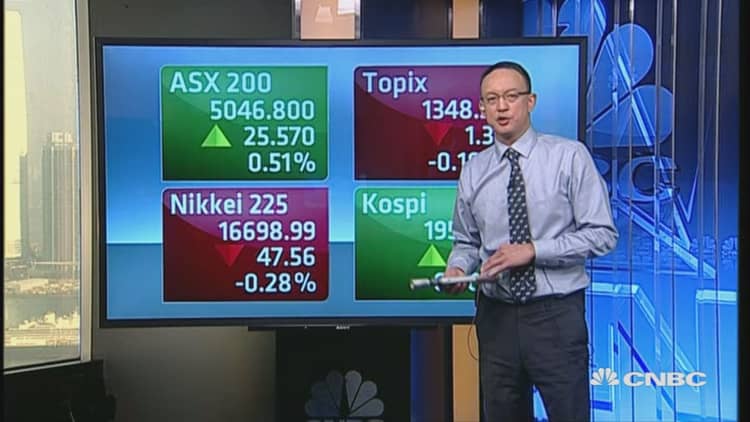
Hong Kong's Hang Seng index was the odd one out as markets across Asia extended gains on Thursday ahead of a series of key global events due to take place in the coming days.
Japan's benchmark closed up 213.61 points, or 1.28 percent, at 16,960.16 while the broader Topix gained 19.44 points, or 1.44 percent, to 1,369.05. South Korea's Kospi added 10.75 points, or 0.55 percent, to 1,958.17. Meanwhile, Hong Kong's lost 0.73 percent in afternoon trade.
Chinese markets finished the session mixed, with the gaining 10.24 points, or 0.36 percent, to 2,859.92. The smaller Shenzhen composite closed down 2.45 points, or 0.13 percent, at 1,758.13.
Down Under, the S&P/ASX 200 closed up 59.88 points, or 1.19 percent, at 5,081.12, boosted by gains in the financials, energy, and materials sectors - up 1.78, 1.15 and 1.98 percent, respectively.
Angus Nicholson, a market analyst from IG, said in an afternoon note that the resurgence in commodities prices, from oil to industrial metals, appeared to underpin the positive moves in equities.
He added the rally could find near term support from a series of important events due to take place in the coming days. These include the upcoming U.S. non-farm payrolls report on Friday, China's National People's Congress (NPC) that begins this weekend , as well as European Central Bank and Bank of Japan meetings next week.
Nicholson warned, "Of course, the markets currently look like they are pricing good news in from all of them, so an upset from any one could throw the rally off.
According to data released this morning, it appeared the growth momentum in China's service sector has softened, with business activity expanding at only a modest pace.
The Caixin services purchasing managers' index (PMI) for February was at 51.2 versus January's 52.4. This follows the official services PMI, released earlier in the week, which also indicated a slower expansion. The PMI fell to 52.7 in February, from 53.5 a month earlier.
A reading above 50 indicates an expansion while a reading below suggests contraction in activity.
"Overall, the services sector has outperformed manufacturing industries, reflecting continued improvement in the economic structure," said He Fan, chief economist at Caixin Insight Group in a statement. "While implementing measures to stabilize economic growth, the government needs to push forward reform on the supply side in the services sector to release its potential," he added.
Before the market open, the People's Bank of China (PBOC) set the yuan mid-point at 6.5412 to the dollar, compared with Wednesday's fix of 6.5490. The was at 6.5438 as of 3:19 p.m. HK/SIN time.
Elsewhere, the Japanese yen retreated against the dollar back to the 114 handle; the dollar/yen earlier hit a session low of 113.40. As of 1:10 p.m. HK/SIN time, the pair traded up 0.62 percent at 114.14.
Japanese exporters closed mostly up with the likes of Toyota adding 1.33 percent, Nissan gaining 3.43 percent, and Honda up 2.92 percent. Usually, a weaker yen is positive for exporters as it increases their overseas profits when converted into local currency.
Across the Korean Strait, South Korea's annual inflation in February picked up quicker than previously expected. Official data showed the consumer price index (CPI) rose 1.3 percent on-year in February and was up from a 0.8 percent increase in January.
Earlier, Australia posted a narrower-than-expected trade deficit of A$2.94 billion ($2.14 billion) for January, against a Reuters consensus of A$3.1 billion.
Mining stocks in Australia mostly finished up on Thursday on the back of higher commodity prices. Shares of Rio Tinto closed up 2.08 percent, Fortescue was up 6.67 percent, and BHP Billiton gained 3.11 percent.
Overnight, BHP and mining company Vale reached a deal with the Brazilian government to pay an estimated 20 billion reais ($5.1 billion) in damages over 15 years for the Samarco mining disaster late last year, Reuters reported. The disaster was considered one of Brazil's worst environmental disasters that killed 19 people and left hundreds homeless and polluted a major river.
Oil prices retreated during late afternoon in Asia, with the West Texas Intermediate (WTI) crude slipping 0.26 percent to $34.57 a barrel as of 3:30 p.m. HK/SIN time, following an overnight gain of 0.76 percent. Global benchmark Brent was down 0.7 percent at $36.67 a barrel, after settling up 0.32 percent during U.S. hours.
Energy plays were mixed in Asia with Santos closing up 2.5 percent, Oil Search added 3.29 percent, Japan's Inpex higher by 5.82 percent. Mainland shares of Sinopec lost 0.15 percent.
Market participants will look to China's NPC this weekend for the country's 2016 gross domestic product targets.
David Gaud, senior portfolio manager at Edmond de Rothschild Asset Management, told CNBC's "Squawk Box" another important topic of focus will be the budget deficit.
"One important topic would be the budget deficit, the fiscal deficit, if there is any, a strong indication that this may be increased this year, showing that at least the government is going to try to support the momentum. And so that should further improve the sentiment towards China from the market."
Overnight, major U.S. indexes registered small gains, with the up 0.2 percent, the S&P 500 up 0.41 percent and the higher by 0.29 percent.
The U.S. Federal Reserve released its Beige Book on Wednesday local time that showed economic activity increased in most regions. Consumer spending also rose in most districts.


